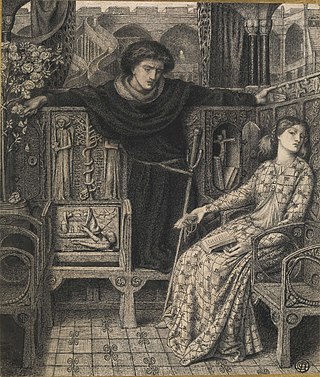
The Tragedy of Hamlet, Prince of Denmark, usually shortened to Hamlet, is a tragedy written by William Shakespeare sometime between 1599 and 1601. It is Shakespeare's longest play. Set in Denmark, the play depicts Prince Hamlet and his attempts to exact revenge against his uncle, Claudius, who has murdered Hamlet's father in order to seize his throne and marry Hamlet's mother. Hamlet is considered among the "most powerful and influential tragedies in the English language", with a story capable of "seemingly endless retelling and adaptation by others". It is widely considered one of the greatest plays of all time. Three different early versions of the play are extant: the First Quarto ; the Second Quarto ; and the First Folio. Each version includes lines and passages missing from the others.

Sigmund Freud was an Austrian neurologist and the founder of psychoanalysis, a clinical method for evaluating and treating pathologies seen as originating from conflicts in the psyche, through dialogue between patient and psychoanalyst, and the distinctive theory of mind and human agency derived from it.

Alfred Ernest Jones was a Welsh neurologist and psychoanalyst. A lifelong friend and colleague of Sigmund Freud from their first meeting in 1908, he became his official biographer. Jones was the first English-speaking practitioner of psychoanalysis and became its leading exponent in the English-speaking world. As President of both the International Psychoanalytical Association and the British Psycho-Analytical Society in the 1920s and 1930s, Jones exercised a formative influence in the establishment of their organisations, institutions and publications.
Psychoanalytic literary criticism is literary criticism or literary theory that, in method, concept, or form, is influenced by the tradition of psychoanalysis begun by Sigmund Freud.
In psychoanalytic theory, the id, ego and superego are three distinct, interacting agents in the psychic apparatus, defined in Sigmund Freud's structural model of the psyche. The three agents are theoretical constructs that Freud employed to describe the basic structure of mental life as it was encountered in psychoanalytic practice. Freud himself used the German terms das Es, Ich, and Über-Ich, which literally translate as "the it", "I", and "over-I". The Latin terms id, ego and superego were chosen by his original translators and have remained in use.
Psychoanalytic theory is the theory of personality organization and the dynamics of personality development relating to the practice of psychoanalysis, a clinical method for treating psychopathology. First laid out by Sigmund Freud in the late 19th century, psychoanalytic theory has undergone many refinements since his work. The psychoanalytic theory came to full prominence in the last third of the twentieth century as part of the flow of critical discourse regarding psychological treatments after the 1960s, long after Freud's death in 1939. Freud had ceased his analysis of the brain and his physiological studies and shifted his focus to the study of the psyche, and on treatment using free association and the phenomena of transference. His study emphasized the recognition of childhood events that could influence the mental functioning of adults. His examination of the genetic and then the developmental aspects gave the psychoanalytic theory its characteristics.

Three Essays on the Theory of Sexuality, sometimes titled Three Contributions to the Theory of Sex, is a 1905 work by Sigmund Freud, the founder of psychoanalysis, in which the author advances his theory of sexuality, in particular its relation to childhood.

Theodor Reik was a psychoanalyst who trained as one of Freud's first students in Vienna, Austria, and was a pioneer of lay analysis in the United States.
In philology, a lapsus is an involuntary mistake made while writing or speaking.

Totem and Taboo: Resemblances Between the Mental Lives of Savages and Neurotics, or Totem and Taboo: Some Points of Agreement between the Mental Lives of Savages and Neurotics, is a 1913 book by Sigmund Freud, the founder of psychoanalysis, in which the author applies his work to the fields of archaeology, anthropology, and the study of religion. It is a collection of four essays inspired by the work of Wilhelm Wundt and Carl Jung and first published in the journal Imago (1912–13): "The Horror of Incest", "Taboo and Emotional Ambivalence", "Animism, Magic and the Omnipotence of Thoughts", and "The Return of Totemism in Childhood".

Abraham Arden Brill was an Austrian Empire-born psychiatrist who spent almost his entire adult life in the United States. He was the first psychoanalyst to practice in the United States and the first translator of Sigmund Freud into English.

Prince Hamlet is the title character and protagonist of William Shakespeare's tragedy Hamlet (1599–1601). He is the Prince of Denmark, nephew to the usurping Claudius, and son of King Hamlet, the previous King of Denmark. At the beginning of the play, he is conflicted whether, and how, to avenge the murder of his father, and struggles with his own sanity along the way. By the end of the tragedy, Hamlet has caused the deaths of Polonius, Laertes, Claudius, and Rosencrantz and Guildenstern, two acquaintances of his from childhood. He is also indirectly involved in the deaths of his love Ophelia (drowning) and of his mother Gertrude.
Father complex in psychology is a complex—a group of unconscious associations, or strong unconscious impulses—which specifically pertains to the image or archetype of the father. These impulses may be either positive or negative.
Otto Fenichel was a psychoanalyst of the so-called "second generation".

From its premiere at the turn of the 17th century, Hamlet has remained Shakespeare's best-known, most-imitated, and most-analyzed play. The character of Hamlet played a critical role in Sigmund Freud's explanation of the Oedipus complex. Even within the narrower field of literature, the play's influence has been strong. As Foakes writes, "No other character's name in Shakespeare's plays, and few in literature, have come to embody an attitude to life ... and been converted into a noun in this way."

James Beaumont Strachey was a British psychoanalyst, and, with his wife Alix, a translator of Sigmund Freud into English. He is perhaps best known as the general editor of The Standard Edition of the Complete Psychological Works of Sigmund Freud, "the international authority".
Hans Loewald (1906–1993) was a German-American psychoanalyst and theorist. While apparently a traditional Freudian, Loewald in his thinking was both elegant and quietly revisionist - a radical conservatist.

In classical psychoanalytic theory, the Oedipus complex refers to a son's sexual attitude towards his mother and concomitant hostility toward his father, first formed during the phallic stage of psychosexual development. A daughter's attitude of desire for her father and hostility toward her mother is referred to as the feminine Oedipus complex. The general concept was considered by Sigmund Freud in The Interpretation of Dreams (1899), although the term itself was introduced in his paper A Special Type of Choice of Object made by Men (1910).
Penis envy is a stage in Sigmund Freud's theory of female psychosexual development, in which young girls experience anxiety upon realization that they do not have a penis. Freud considered this realization a defining moment in a series of transitions toward a mature female sexuality. In Freudian theory, the penis envy stage begins the transition from attachment to the mother to competition with the mother for the attention and affection of the father. The young boy's realization that women do not have a penis is thought to result in castration anxiety.

Hanns Sachs was one of the earliest psychoanalysts, and a close personal friend of Sigmund Freud. He became a member of Freud's Secret Committee of six in 1912, Freud describing him as one "in whom my confidence is unlimited in spite of the shortness of our acquaintance".












